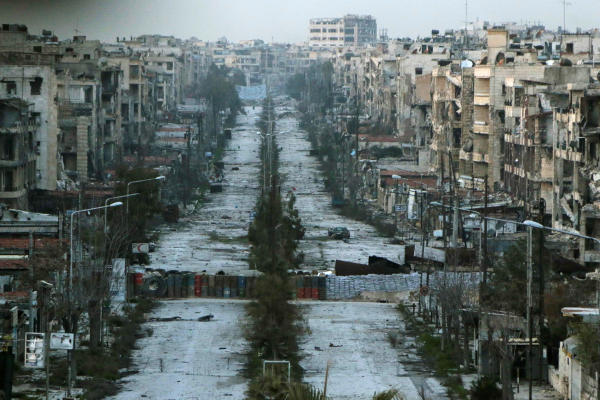Alsharaq Al-Awsat
Since the beginning of the Syrian uprising in 2011 against Bashar Al Assad’s regime, some have predicted the country would be divided along ethnic and sectarian lines. The main catalyst for the division is fears for the safety of minorities. As time went by, the uprising has turned into internal wars and then into military interventions by foreign powers such an Iran, Russia, Iraq and Hezbollah. Foreign and local jihadist organisations such as ISIS, Al-Nusra Front and Ahrar Al-Sham have taken up residence in Syria. Twelve million Syrians have been displaced from their towns, villages and regions because of the disasters of war. A third of them sought refuge abroad, some relocated to areas that suit them and the rest fled the killings and destruction within the country.
Talk about dividing Syria has recommenced because US officials finally said that it is unlikely that the country will remain united and that the division of the country is more likely. Some have considered this a prelude to the division and the beginning of a new Sykes-Picot on the grounds that the old agreement between the French and the British has expired after the passing of a hundred years. This time, it is the Russians and the Americans who have agreed to a new division of the region.
Is there really an agreement on the division of Syria between major powers? Frankly, this is unlikely for many reasons, the most notable of which is that they lack the power on the ground to impose any borders in the Middle East, whether old or new. The Russians and the Iranians have been trying to carry out an easier task for a while now; consolidating Assad’s rule in areas under his control. However, they have yet to succeed, let alone create new and conflicting entities that compete for resources and borders.
A similar example of chaos and war can be seen in Syria’s neighbour Iraq. Since 1990, Iraqi Kurds have been living in a semi- autonomous region following the war to liberate Kuwait. 26 years have passed and the situation of the Iraqi Kurds has not changed. The establishment of a Kurdish republic in northern Iraq was not objected to by Saddam, Turkey or Iran (the three parties that usually oppose any independent Kurdish entity). Rather, it was the international community, the term usually used to describe the permanent members of the United Nations Security Council, that refused to grant the Kurds independence. The reason for this is that no one wants to change the map of the region as this may cause disintegration which would lead to uncontrollable chaos.
The international community may change its mind with the continuation of chaos and blood in Syria, and may have become convinced that the division is a less evil solution than a troubled state. Implementing this might have been possible in the first two years of the Syrian revolution. However, migration has changed demographics, and therefore I do not see how Syria will be divided without the presence of large homogeneous communities. The city of Manbij is a model; many of its inhabitants fled to the countryside and beyond after ISIS occupied it. When extremist Syrian militia forces entered the city to expel ISIS with international support, they also expelled much of the population on the grounds of ethnicity and about 200,000 people fled the area.
We cannot ignore the regional factor and fears of countries like Turkey, Iran and Iraq. Syrian ethnic and sectarian components have extensions in these countries, and any recognition of entities based on ethnic considerations would threaten the unity of neighbouring countries. Turkey strongly opposes the attempt to establish Kurdish areas along its border. Even Iran, which does not share a border with Syria, fears that such attempts may stir separatist feelings among its own Kurdish population that numbers around 8 million. The situation is not much better for Syria’s Alawites who were made to take responsibility for the regime because the Assad family are members of the Alawite sect. Many of their youth have left the country to escape forced military service and thousands of families have taken refuge elsewhere for fear of reprisals.
The prerequisite for dividing any country is that residents must be able to return to their areas. This happened in Yugoslavia which was divided into four republics under international auspices after the civil war. As for the situation in Syria, it is like a broken vessel that has shattered into small pieces. A solution in Syria that involves maintaining the structure of the state with a new political system under international auspices will be an especially difficult task in light of the Iranian and Russian occupation of Syria on Assad’s behalf.

